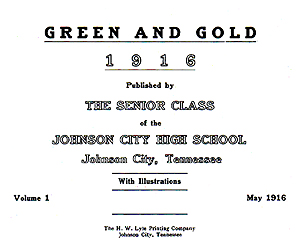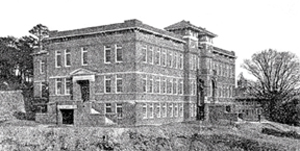Science Hill High School’s 1916 annual, titled “Green and Gold,” measured approximately 6 by 8.5 inches. The cover was appropriated adorned in green with gold letters.
The original owner, Edith Opal Clark, wrote her name on the inside cover and dated it May 19, 1916. H.W. Lyle Printing Company of Johnson City published it. A photograph of the new school revealed that the building was complete but the grounds had not yet been landscaped.

The Editorial Staff consisted of F.L. Wallace (Editor-in Chief), H.L. Faw (Business Manager), E. Vance Jones (Assistant Business Manager), Ethel Deane Riddell (Class Editor), Ruth McCorkle (Editor of Wit and Humor), Ernest T. Hodge (Athletic Editor) and Helen L. Johnson (Art Editor).
The dedication page contained a picture to whom the annual was dedicated with these words: “We, the members of the senior class, do hereby humbly dedicate this issue of the ‘Green and Gold’ to our esteemed superintendent, Mr. Charles E. Anderson and loyal members of the faculty in recognition of the faithful service rendered by them.” The group also expressed their appreciation to W.I. Williams, Faculty Advisor.

Faculty members (and classes they taught) were M. A Crary (Principal, Manual Training), Miss Lucy Hatcher (Mathematics, later principal), Miss Floy Harris (Latin), James L. Gilbert (Commercial), Joseph D. Clark (English), Miss Cherry Mae Preston (Music), Miss Una V. Jones (Modern Languages), Mr. A. F. Roller (Science), Miss Edith Barton (Departmental Teacher), Miss Clara Fulton (Assistant, Domestic Science) Miss Ruth Baxter (Departmental Teacher), Miss Willie Blance Hook (Departmental Teacher) and Miss Ella Burrow (Departmental Teacher).
The senior class consisted of 21 students. Superlatives included “Most Popular,” Ethel Riddell; “Most Obliging,” William Mitchell; “Biggest Grouch,” James Emmert; “Ladies’ Man,” Freddie Lockett; “Sleepiest,” F. Lee Wallace; “Noisiest,” H. Bear Miller, “Biggest Rube,” Reeves Haves and “Boss,” Ikie Williams.
A senior class poem titled “Home Coming to Johnson City” is a clever imaginary revisit to the city: “Why ‘tis August, nineteen and thirty; And today in my aeroplane; I came back to Johnson City; To see my classmates again. Just fourteen years ago in May; The diplomas from the JCHS; Were handed us. We parted then; To Where, I dared not guess.” The 104-line poem went on to envision where the students migrated after high school and how well they performed in their respective careers.
Hannah Elizabethton Doak penned a class song to the tune of “Then You’ll Remember Me.” The first of four stanzas read “Thru four long years we’ve studied hard; But we’ve enjoyed it too; Old Science Hill, our joy and pride; We bid farewell to you. Tho’ time may change, we’ll ne’er forget; The watchtower on the hill, Tho’ o’er the land and sea we go; Your voice will be calling still; Won’t you remember, O remember me.”
One page was an essay on “The Three Degrees of Mathematics.” The first paragraph made crystal clear one student’s disdain for the dreaded subject: “Mathematics is that form of the most heinous torture ever invented by the ingenuity of man. Centuries ago it was used exclusively for the punishment of the most hardened criminals and was more dreaded than the rack or the guillotine. Since its invention, however, it has been introduced into schools, where it is used for the utter bewilderment and torture of defenseless and miserable students.”
In 1916, five student societies were available to the students: Young Men’s Christian Society (male), Francis E. Willard Literary Society (female), Jefferson Literary Society (male), Adelphian Literary Society (male) and Ossolian Literary Society (female).
The Athletic Association officers were M.A. Crary (president and treasurer), Fred R. Lockett (v-president), Earnest Hodge (secretary and baseball manager), Hubert Brooks (football manager), Eugene Parsons (basketball manager) and Harry Lusk (baseball captain).
Johnson City High School’s 11-student football team was one of the best football teams in upper East Tennessee. According to the annual, they played on the home field with Bristol on Thanksgiving Day: “The game was fast, both teams playing well and going together like steam engines with but little gains for either.” Bristol scored a touchdown in the first half but failed on the field goal attempt. In the second half, Johnson City broke the line and carried the ball safely for a touchdown. The game ended in a six to six tie.
The basketball program was described in an amusing depiction: The majority of the participants were very small in stature, but as the old saying is ‘They were little but loud.’ We cannot boast of having the gymnasium that some schools have, but when it comes to defeating the heavy, fast Boston Girls in a cement garage, where great skill must be employed in dodging Cadillacs, Buicks and various other kinds of cars, including Fords, the Johnson City boys are there with the goods.” The specific location of the games was not identified.
Rain was a constant problem for the baseball team during the spring of 1916 causing cancellation of several games. The key victory was defeating Emory and Henry, described as being a fast team, by a score of 11 to 4.
Finally, Joseph D. Clark wrote a brief essay on “The Work of the YMCA.” In part it read: “The greatest moral agency in the high school during the last two years has been the YMCA. The young men have found that there is more in school than text books and athletics, good as they are; they have found in the YMCA a great democratic stimulus, a friend that has helped to make true friends.”
